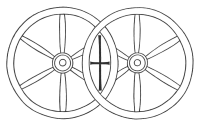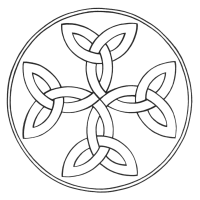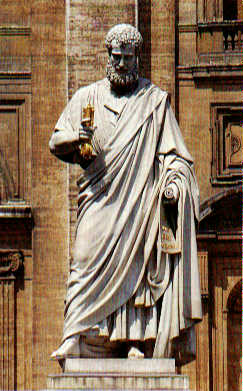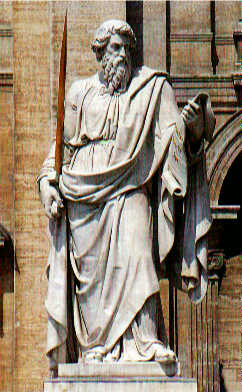 Introduction:
Introduction:
by Felix Just, S.J., Ph.D.
 Introduction:
Introduction:
The Acts of the Apostles does not contain a complete history of the growth and expansion of Christianity in its first generation, but focuses only on a few missionaries active in a few geographical areas. Its selections are theologically driven, not historically comprehensive.
Just as in Luke's Gospel, the Spirit of God inspires and guides most of the action within the Acts of the Apostles. Some scholars even suggest that this book could better be called "The Acts of the Holy Spirit":
A whole series of speeches and sermons delivered by the apostles in various contexts (esp. by Peter or Paul) summarize the essence of the early Christian preaching about Jesus:
 Each of these sermons and speeches include many, if not all, of the following key points:
Each of these sermons and speeches include many, if not all, of the following key points:
Several passages early in Acts summarize the most important features of the community life of the early believers in Jerusalem:
The portrayal of the apostles in Acts is very similar to the portrait of Jesus in Luke's Gospel. Just like Jesus, the apostles are filled with the Holy Spirit, they quote from the scriptures in their preaching, they teach and heal, they perform miracles and exorcisms, they gain followers but also stir up opponents, they are persecuted and some of them are arrested, but they forgive their opponents and remain faithful to God even if they are killed:
| The Apostles in Acts | Jesus in Luke's Gospel |
| The Holy Spirit descends on the apostles at Pentecost, as they are praying (2:1-4) | The Holy Spirit descends on Jesus at his baptism, as he is praying (3:21-22) |
| Peter preaches, quoting from the prophet Joel (2:16-36; quoting Joel 2:28-32) | Jesus preaches, after reading from the prophet Isaiah (4:14-30; quoting Isa 61:1-2) |
| The apostles call people to join them (2:37-41, 47b) | Jesus calls his first followers (5:1-11, 27-32) |
| Peter and John heal a lame beggar (3:1-10) | Jesus heals a lame man (5:17-26) and a blind beggar (18:35-43) |
| The high priest arrests several apostles and questions them before the council (4:1-22) | Jesus is arrested and interrogated by the council (22:47-71) |
| The narrator summarizes the "signs and wonders" of the apostles, especially their healings and exorcisms (5:12-16; 8:6-7, 13) |
The narrator summarizes the miraculous activity of Jesus, |
| The sick are healed through Peter's shadow (5:15) and Paul's handkerchiefs (19:11-12) | A woman is healed when she touches the fringes of Jesus' clothing (8:43-48) |
| The Jewish leaders want to kill the apostles, because of their teachings (5:17-42) | Jewish leaders plot to kill Jesus, partly due to his teachings (19:45-48) |
| As he is being stoned to death, Stephen hands his spirit over to the Lord Jesus and forgives his executioners (7:59-60) |
As he is dying on the cross, Jesus forgives his executioners and hands his spirit over to God (23:34, 46) |
| Peter raises the widow Tabitha (a.k.a. Dorcas) from the dead at Joppa (9:36-42) | Jesus raises a widow's son from the dead at Nain (7:11-17) |
| The apostles encounter a pious Roman centurion (10:1-48) | Jesus heals the slave of a faithful Roman centurion (7:1-10) |
| The apostles undertake missionary journeys to Gentiles (13:1--19:20) | Jesus undertakes missionary journey to Gentiles (10:1-12) |
| Paul feels compelled by the Spirit to go to Jerusalem, despite the dangers that await him there (19:21; 21:8-17) |
Jesus is determined to go to Jerusalem, despite the dangers that await him there (9:51; 13:33; 19:11-28) |
| Paul is welcomed in Jerusalem by the believers, and soon goes to the temple (21:17-26) | Jesus is welcomed in Jerusalem by large crowds, and soon goes to the temple (19:28-48) |
| Paul is seized by a Jewish mob that wants him killed, but later stands trial before Roman governors (21:30-36; 23:23–26:32) |
Jesus is arrested by a Jewish mob, but is later turned over to the Roman procurator for trial (22:47-54; 23:1-25) |
| Paul is slapped on orders of the high priest (23:2) | Jesus is slapped by the high priest's attendants (22:63-64) |
| Paul argues against the Sadducees, who do not believe in the resurrection (23:6-9) | Jesus is questioned by some Sadducees, who deny the concept of resurrection (20:29-38) |
| Paul is declared innocent three times (23:9, 29; 26:31) | Jesus is declared innocent three times (23:4, 14-15, 22) |
| Paul takes bread, gives thanks, breaks it, and eats (27:35; cf. 20:7-11) | Jesus takes bread, blesses it, breaks it, and gives it to his disciples to eat (22:19; cf. 24:30) |
| Paul is regarded favorably by a Roman centurion (27:43) | Jesus is declared innocent by a Roman centurion (23:47) |
| The reactions to Paul's preaching are a fulfillment of the scriptures (28:23-28) | The life and death of Jesus are a fulfillment of the scriptures (24:44-47) |
Not only are the words and actions of all the apostles shown to be similar to those of Jesus, but the portrayals of the apostles Peter and Paul are similar in many significant respects in the Acts of the Apostles:
| Peter [in Acts 2—12] |
Parallel Action | Paul [in Acts 13—28] |
||
 |
1:21-22 | Both function as witnesses to the risen Christ | 23:11; 26:16 |  |
| 2:1-40 | The Holy Spirit initiates and guides their actions | 13:1-40 | ||
| 3:12-26 | Both heal people who are lame or unable to speak | 13:1-40 | ||
| 5:34-39 | Both are defended by Pharisees in the Sanhedrin | 23:9 | ||
| 6:1-6 | Both appoint other leaders with prayer and laying on hands | 14:23 | ||
| [6:8—8:4, Stephen] | Their persecution (stoning) leads to broadening the mission | 14:19-23 | ||
| [6:13-14, Stephen] | Both are accused of acting against Moses | 21:20-21; 25:8 | ||
| 8:9-24 | Both encounter and confront a magician | 13:6-12 | ||
| 8:14-17 | Both bestow the Spirit through the laying on of hands | 19:1-6 | ||
| 9:36-43 | Both raise a dead person back to life | 20:9-12 | ||
| 10:25-26 | Some Gentiles try to worship them | 14:13-15 | ||
| 11:1-18 | In Jerusalem, they defend the mission to Gentiles | 21:15-40 | ||
| 12:4-7 | Both are imprisoned at a Jewish feast | 21:16-28 | ||
| 12:6-11 | Both are delivered from prison | 16:24-26 | ||
| 12:24 | Conclusion: The word of God continues to spread | 28:30-31 |
(based on Pheme Perkins, Reading the New Testament, pp. 264)
Return to the HOME PAGE of Felix Just, S.J.
This page was last updated on
May 1, 2025
Copyright © 1999; 2025